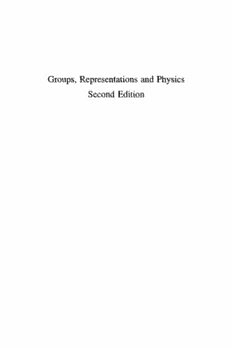Table Of ContentGroups, Representations and Physics
Second Edition
Groups, Representations
and Physics
Second Edition
HF Jones
Department of Physics, Imperial College of Science,
Technology and Medicine, London
Published in 1998 by Published in Great Britain by
Taylor & Francis Group Taylor & Francis Group
270 Madison Avenue 2 Park Square
New York, NY 10016 Milton Park, Abingdon
Oxon OX14 4RN
© 1998 by Taylor & Francis Group, LLC
No claim to original U.S. Government works
Printed in the United States of America on acid-free paper
109876543
International Standard Book Number-IO: 0-7503-0504-5 (Softcover)
International Standard Book Number-13: 978-0-7503-0504-4 (Softcover)
This book contains information obtained from authentic and highly regarded sources. Reprinted material is
quoted with permission, and sources are indicated. A wide variety of references are listed. Reasonable efforts
have been made to publish reliable data and information, but the author and the publisher cannot assume
responsibility for the validity of all materials or for the consequences of their use.
No part of this book may be reprinted, reproduced, transmitted, or utilized in any form by any electronic,
mechanical, or other means, now known or hereafter invented, including photocopying, microfilming, and
recording, or in any information storage or retrieval system, without written permission from the publishers.
Trademark Notice: Product or corporate names may be trademarlcs or registered trademarks, and are used only
for identification and explanation without intent to infringe.
Library of Congress Cataloging·in·Publication Data
Catalog record is available from the Library of Congress
informa
Visit the Taylor & Francis Web site at
http://www.taylorandfrancis.com
Thylor & Francis Group
is the Academic Division of Jnfonna pie.
Contents
Preface to the Second Edition ix
Preface to the First Edition xi
Acknowledgments xv
1 Introduction 1
1.1 Symmetry in physics; groups and representations 1
1.2 Definition of a group; some simple examples 3
1.3 Some simple point groups 5
1.4 The permutation group Sn 11
Problems for Chapter 1 17
2 General Properties of Groups and Mappings 19
2.1 Conjugacy and conjugacy classes 19
2.2 Subgroups 23
2.3 Normal subgroups 25
2.4 Homomorphisms 29
Problems for Chapter 2 33
3 Group Representations 35
3.1 A simple example; formal definition 35
3.2 Induced transformation of the quantum mechanical
wavefunction 38
3.3 Equivalence of representations; characters; reducibility 43
3.4 Groups acting on vector spaces 46
3.5 Scalar product; unitary representations; Maschke's theorem 53
Problems for Chapter 3 57
vi Contents
4 Properties of Irreducible Representations 59
4.1 Schur's lemmas 59
4.2 The fundamental orthogonality theorem 62
4.3 Orthogonality of characters 64
4.4 Construction of the character table 68
4.5 Direct products of representations and their decomposition 73
Problems for Chapter 4 75
5 Physical Applications 78
5.1 Macroscopic properties of crystals 78
5.2* Molecular vibrations (H 0) 82
2
5.3 Raising of degeneracy 91
Problems for Chapter 5 94
6 Continuous Groups (SO(N)) 96
6.1 S0(2) 96
6.2 S0(3) (SU(2)) 101
6.3 Clebsch-Gordan coefficients 109
Problems for Chapter 6 119
7 Further Applications 121
7.1 Energy levels of atoms in Hartree-Fock scheme 121
7.2 'Accidental' degeneracy of the H atom and S0(4) 124
7.3* The partial wave expansion; unitarity 128
7.4 Isotopic spin; rr N scattering 136
Problems for Chapter 7 139
8 The SU(N) Groups and Particle Physics 140
8.1 The relation between SU(2) and S0(3) 140
8.2 SU(2) 142
8.3 SU(3) 149
8.4 SU(N); Young tableaux 158
Problems for Chapter 8 164
Contents Vll
9 General Treatment of Simple Lie Groups 167
9.1 The adjoint representation and the Killing form 168
9.2 The Cartan basis of a Lie algebra 170
9.3 Properties of the roots and root vectors 172
9.4 Quantization of the roots 174
9.5* Simple roots-Dynkin diagrams 180
9.6 Representations and weights 190
Problems for Chapter 9 196
10 Representations of the Poincare Group 198
10.1 Lorentz transformations 198
10.2 4-vector notation 201
10.3 The Lorentz group S0(3, 1) 204
10.4 The Poincare group 208
10.5 Angular momentum states 216
Problems for Chapter 10 222
11 Gauge Groups 225
11.1 The electromagnetic potentials; gauge transformations 225
11.2 Interaction with non-relativistic electrons 227
11.3 Relativistic formulation of electromagnetism 229
11.4 Relativistic equation of motion for the electron 231
11.5 Quantum fields and their interactions 235
11.6 Gauge field theories 240
Problems for Chapter 11 247
Appendices
A Dirac Notation in Quantum Mechanics 249
B Eigenstates of Angular Momentum in Quantum Mechanics 264
c
Group-invariant Measure for S0(3) 271
D Calculation of Roots for SO(n) and Sp(2r) 275
E Covariant Normalization and Relativistic Scattering 279
F Lagrangian Mechanics 282
vm Contents
Glossary of Mathematical Symbols 289
Bibliography 291
Problem Solutions 293
Index 319
*'Starred' sections are somewhat specialized, and may be omitted at a first
reading.
Preface to the Second Edition
In this second edition I have taken the opportunity to expand the scope
of the book somewhat by including a new chapter (Chapter 9) on the
Cartan-Weyl-Dynkin approach to Lie algebras. This is a generalization
to more complicated Lie algebras of the method of raising and lowering
operators used to obtain the irreps of SU(2). It is a systematic and unified
approach, which allows one to classify all possible simple Lie algebras
and, in principle, to find all their irreducible representations. I hope that
inclusion of this topic, albeit in a necessarily rather condensed form, will
extend the usefulness of the book.
I am grateful to those readers who took the trouble to contact me
pointing out various errors in the previous edition, and I have corrected
those remaining errors of which I am aware.
HF Jones
London, February 1998

